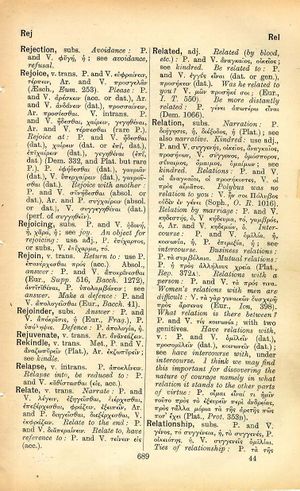relation: Difference between revisions
Θησαυρός ἐστι τῶν κακῶν κακὴ γυνή → Ingens mali thesaurus est mulier mala → Ein Schatz an allem Schlechten ist ein schlechtes Weib
mNo edit summary |
m (Woodhouse1 replacement) |
||
| Line 1: | Line 1: | ||
{{Woodhouse1 | {{Woodhouse1 | ||
|Text=[[File:woodhouse_689.jpg|thumb|link={{filepath:woodhouse_689.jpg}}]] | |Text=[[File:woodhouse_689.jpg|thumb|link={{filepath:woodhouse_689.jpg}}]] | ||
===substantive=== | |||
[[narration]]: P. [[διήγησις]], ἡ, [[διέξοδος]], ἡ ( | [[narration]]: [[prose|P.]] [[διήγησις]], ἡ, [[διέξοδος]], ἡ ([[Plato]]); see also [[narrative]]. | ||
[[kindred]]: use adj., P. and V. [[συγγενής]], [[οἰκεῖος]], [[ἀναγκαῖος]], [[προσήκων]], V. [[σύγγονος]], [[ὁμόσπορος]], [[σύναιμος]], [[ὅμαιμος]], [[ὁμαίμων]]; see [[kindred]]. | [[kindred]]: use adj., [[prose|P.]] and [[verse|V.]] [[συγγενής]], [[οἰκεῖος]], [[ἀναγκαῖος]], [[προσήκων]], [[verse|V.]] [[σύγγονος]], [[ὁμόσπορος]], [[σύναιμος]], [[ὅμαιμος]], [[ὁμαίμων]]; see [[kindred]]. | ||
[[relations]]: P. and V. | [[relations]]: [[prose|P.]] and [[verse|V.]] [[οἱ ἀναγκαῖοι]], [[οἱ προσήκοντες]], [[verse|V.]] [[οἱ πρὸς αἵματος]]. | ||
[[Polybus was no relation to you]]: V. ἦν σοι | [[Polybus was no relation to you]]: [[verse|V.]] [[ἦν σοι Πόλυβος οὐδὲν ἐν γένει]] ([[Sophocles|Soph.]], ''[[Oedipus Rex]]'' 1016). | ||
[[relation by marriage]]: P. and V. [[κηδεστής]], ὁ, V. [[κήδευμα]], τό, [[γαμβρός]], ὁ, Ar. and V. [[κηδεμών]], ὁ. | [[relation by marriage]]: [[prose|P.]] and [[verse|V.]] [[κηδεστής]], ὁ, [[verse|V.]] [[κήδευμα]], τό, [[γαμβρός]], ὁ, [[Aristophanes|Ar.]] and [[verse|V.]] [[κηδεμών]], ὁ. | ||
[[intercourse]]: P. and V. [[ὁμιλία]], ἡ, [[κοινωνία]], ἡ, P. [[ἐπιμιξία]], ἡ; see [[intercourse]]. | [[intercourse]]: [[prose|P.]] and [[verse|V.]] [[ὁμιλία]], ἡ, [[κοινωνία]], ἡ, [[prose|P.]] [[ἐπιμιξία]], ἡ; see [[intercourse]]. | ||
[[business relations]]: P. | [[business relations]]: [[prose|P.]] [[τὰ συμβόλαια]]. | ||
[[mutual relations]]: P | [[mutual relations]]: [[prose|P.]] [[ἡ πρὸς ἀλλήλους χρεία]] ([[Plato]], ''[[Republic]]'' 372A). | ||
[[relations with a person]]: P. and V. | [[relations with a person]]: [[prose|P.]] and [[verse|V.]] [[τὰ πρός τινα]]. | ||
[[women's relations with men are difficult]]: V. τὰ γὰρ γυναικῶν δυσχερῆ πρὸς ἄρσενας (Eur., ''Ion'', 398). [[what relation is there between]]? P. and V. | [[women's relations with men are difficult]]: [[verse|V.]] [[τὰ γὰρ γυναικῶν δυσχερῆ πρὸς ἄρσενας]] ([[Euripides|Eur.]], ''[[Ion]]'', 398). [[what relation is there between]]? [[prose|P.]] and [[verse|V.]] [[τίς κοινωνία]]; with two genitives. | ||
[[have relations with]], v.: P. and V. ὁμιλεῖν (dat.), προσομιλεῖν (dat.), κοινωνεῖν (dat.); see [[have intercourse with]], under [[intercourse]]. | [[have relations with]], v.: [[prose|P.]] and [[verse|V.]] [[ὁμιλεῖν]]; (dat.), [[προσομιλεῖν]] (dat.), [[κοινωνεῖν]] (dat.); see [[have intercourse with]], under [[intercourse]]. | ||
I [[think]] we may find this [[important]] for discovering the nature of [[courage]] namely in what relation it stands to the other parts of [[virtue]]: P. [[οἶμαι | I [[think]] we may find this [[important]] for discovering the nature of [[courage]] namely in what relation it stands to the other parts of [[virtue]]: [[prose|P.]] [[οἶμαι εἶναί τι ἡμῖν τοῦτο πρὸς τὸ ἐξευρεῖν περὶ ἀνδρείας, πρὸς τἄλλα μόρια τὰ τῆς ἀρετῆς πῶς ποτ' ἔχει]] ([[Plato]], ''[[Protagoras]]'' 353B). | ||
}} | }} | ||
Revision as of 09:15, 20 May 2020
English > Greek (Woodhouse)
substantive
narration: P. διήγησις, ἡ, διέξοδος, ἡ (Plato); see also narrative.
kindred: use adj., P. and V. συγγενής, οἰκεῖος, ἀναγκαῖος, προσήκων, V. σύγγονος, ὁμόσπορος, σύναιμος, ὅμαιμος, ὁμαίμων; see kindred.
relations: P. and V. οἱ ἀναγκαῖοι, οἱ προσήκοντες, V. οἱ πρὸς αἵματος.
Polybus was no relation to you: V. ἦν σοι Πόλυβος οὐδὲν ἐν γένει (Soph., Oedipus Rex 1016).
relation by marriage: P. and V. κηδεστής, ὁ, V. κήδευμα, τό, γαμβρός, ὁ, Ar. and V. κηδεμών, ὁ.
intercourse: P. and V. ὁμιλία, ἡ, κοινωνία, ἡ, P. ἐπιμιξία, ἡ; see intercourse.
business relations: P. τὰ συμβόλαια.
mutual relations: P. ἡ πρὸς ἀλλήλους χρεία (Plato, Republic 372A).
relations with a person: P. and V. τὰ πρός τινα.
women's relations with men are difficult: V. τὰ γὰρ γυναικῶν δυσχερῆ πρὸς ἄρσενας (Eur., Ion, 398). what relation is there between? P. and V. τίς κοινωνία; with two genitives.
have relations with, v.: P. and V. ὁμιλεῖν; (dat.), προσομιλεῖν (dat.), κοινωνεῖν (dat.); see have intercourse with, under intercourse.
I think we may find this important for discovering the nature of courage namely in what relation it stands to the other parts of virtue: P. οἶμαι εἶναί τι ἡμῖν τοῦτο πρὸς τὸ ἐξευρεῖν περὶ ἀνδρείας, πρὸς τἄλλα μόρια τὰ τῆς ἀρετῆς πῶς ποτ' ἔχει (Plato, Protagoras 353B).

